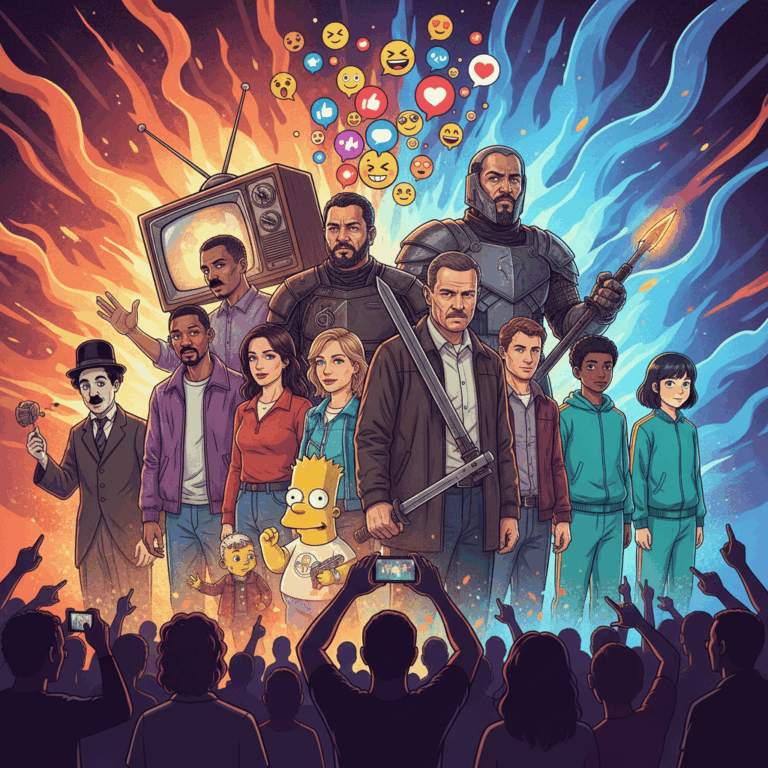Cultural impact of classic series
The classic series they have been fundamental pillars that defined how television connects with the public, creating lasting cultural and social links.
These productions not only entertained, but also shaped the values and perception of families and society at different times.
I Love Lucy and family evolution on television
I Love Lucy it represented a significant change by showing a family dynamic with humor and everyday situations, reflecting the reality of the fifties.
The series helped create an emotional bond between the audience and the characters, setting new standards for comedy and the representation of women on television.
Its innovative format and style influenced later generations, marking the beginning of the evolution of family narrative on the small screen.
The Simpsons and the animated humor revolution
The Simpsons they revolutionized television animation with their characteristic satirical humor and complex characters, becoming a global cultural icon.
The series reflected and criticized social, political and cultural aspects with irreverence, making several generations identify with its stories and messages.
Its longevity and relevance remain valid, demonstrating how animated humor can profoundly influence popular culture.
Social and generational influence of iconic series
Iconic series have shaped generations, influencing social values and behaviors that transcend the screen. Its cultural impact is profound and lasting.
Through memorable characters and narratives, these series have redefined concepts such as friendship, power and psychology, resonating in different layers of society.
Friends and the redefinition of urban friendship
Friends it captured the essence of friendship in an urban context, presenting diverse, everyday relationships that connected with global audiences.
The characters became cultural archetypes, influencing fashion, language and modern concepts about how relationships are lived in the city.
This series created an ideal of community and support among friends, reflecting social changes in contemporary young adult life.
Game of Thrones and modern narrative complexity
Game of Thrones it revolutionized television with a complex story, combining fantasy and political drama, which expanded viewers' expectations.
Its unexpected twists and thematic depth explored universal themes such as power, betrayal and survival, maintaining global attention.
This narrative approach changed the paradigm of television production, inspiring new ways of telling stories on the small screen.
Breaking Bad and The Sopranos: narrative and psychology on TV
Breaking Bad and The Sopranos they elevated television narrative by exploring the complex psychology of their characters and deep moral dilemmas.
Both productions showed that television could reach levels of artistic sophistication comparable to literature and cinema, with intimate and social stories.
His legacy holds that series can be powerful vehicles for reflecting on the human condition and contemporary social issues.
Social issues addressed in the series
Television series have evolved to reflect topics of great social relevance, addressing issues of diversity, equality and mental health with a humane and realistic approach.
These issues not only raise awareness and educate audiences, but also foster dialogue and empathy in increasingly complex and diverse societies.
Diversity, equality and mental health on television
The representation of the cultural diversity and ethnicity in the series has been key to making marginalized groups visible and promoting a more inclusive society.
Furthermore, gender equality and LGBTQ+ rights have been incorporated into plots that question stereotypes and celebrate the plurality of identities.
On the other hand, mental health is an increasingly present topic, with narratives that explore disorders and emotions, helping to destigmatize these realities.
Transformation of consumption and community in streaming
The arrival of the digital platforms it radically changed how we consume series, facilitating broader and more flexible access to quality television content.
This shift democratized entertainment, allowing global audiences to share experiences and discover new stories without geographic restrictions.
Digital platforms and democratization of access
Platforms such as Netflix and Amazon Prime eliminated traditional barriers, offering a varied catalog that reaches any device with an internet connection.
This accessibility encouraged personalized consumption, where the viewer controls what, when and how they watch their favorite series, acquiring greater prominence.
Furthermore, this democratization has driven the production of more diverse content, representing different cultures and voices that previously did not reach mass audiences.
Online communities and active public participation
Social media and specialized forums allow fans to discuss episodes, theories and characters, creating vibrant and engaged digital communities.
This direct interaction between creators and the public enhances the sense of belonging and transforms the audience into an active part of the television cultural phenomenon.
Constant sharing also influences series evolution, as immediate feedback can impact future creative decisions.






